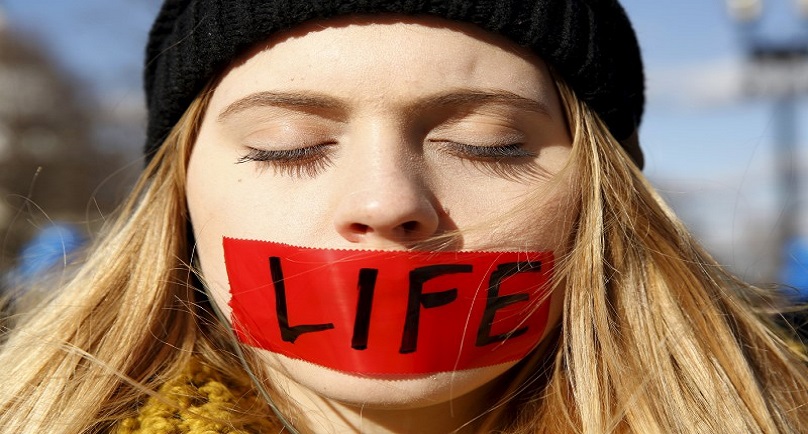Image:A protester with her mouth taped over with the word “life” stands in front of the U.S. Supreme Court on the morning the court takes up a major abortion case focusing on whether a Texas law that imposes strict regulations on abortion doctors and clinic buildings interferes with the constitutional right of a woman to end her pregnancy, in Washington March 2, 2016. REUTERS/Kevin Lamarque
![]()
By Kate Kelland
LONDON (Reuters) – Abortion rates have dropped dramatically in the past 25 years to historic lows in wealthy countries, but dipped only slightly in poorer developing nations, according to a global study published on Wednesday.
The study – by the International Organization (WHO) and Guttmacher Institute – also found that imposing restrictive laws does little to lower abortion rates, but is more likely to force people into having unsafe terminations.
It estimated that on average 56 million abortions took place each year worldwide from 2010 to 2014.
The overall findings highlight a lack in poorer countries of access to modern contraception methods – such as the pill, implants and coils – to reduce unwanted pregnancies, the researchers said.
“In developing countries … family planning services do not seem to be keeping up with the increasing desire for smaller families,” said Gilda Sedgh, who led the research at the Guttmacher Institute in the United States.
More than 80 percent of unintended pregnancies are in women who are not getting the contraception they need, she said, “and many unwanted pregnancies end in abortion”.
She said that by contrast the downward trend in abortion rates in richer countries is largely due to “increased use of modern contraception that has given women greater control over the timing and number of children they want.”
Published in The Lancet medical journal, the study used abortion data from nationally representative surveys, official statistics and other published and unpublished studies, along with information on the level of unmet need for contraception and the prevalence of contraceptive use, by type of method.
The researchers then used a statistical model to estimate levels and trends in abortion incidence for all major world regions and subregions from 1990 to 2014.
The researchers found that between 1990 and 2014, the developed world’s annual abortion rate per 1,000 women of childbearing age (15–44 years) dropped from 46 to 27, mainly as a result of the rate in Eastern Europe more than halving as modern contraceptive methods became more widely available.
Yet in poorer countries, the abortion rate remained virtually unchanged, dropping from 39 to 37.
The study also found that termination rates were similar in countries where abortion is legal and where it is prohibited.
Where abortion is prohibited altogether, or allowed only to save a woman’s life, the rate was 37 abortions per 1,000 women, compared with 34 per 1,000 where it is legal.
“More women living in countries with the most restrictive abortion laws have an unmet need for contraception – that is, they want to avoid getting pregnant but are not using a method of family planning – than women in countries with more liberal laws, and this adds to the incidence of abortion in countries with restrictive laws,” Sedgh said.
EAST EUROPE
Over the last 25 years, Eastern Europe has seen the biggest drop in abortion rates, but rates also fell in Europe and North America, the study found.
The overall abortion rate in Africa, where the vast majority of abortions are illegal, remained virtually unchanged at 34 abortions per 1,000 women in 2014 versus 33 in 1990–94.
“We already know nearly $300 million are spent each year on treating the complications from unsafe abortions,” said Bela Ganatra, a WHO scientist who also worked on the study.
She said the high rates of abortion in developing countries showed the need to improve access to effective contraception.
“Investing in modern contraceptive methods would be far less costly to women and society than having unwanted pregnancies and unsafe abortions,” she said.
(Editing by Jeremy Gaunt)
Copyright 2016Thomson Reuters. Click for Restrictions.


